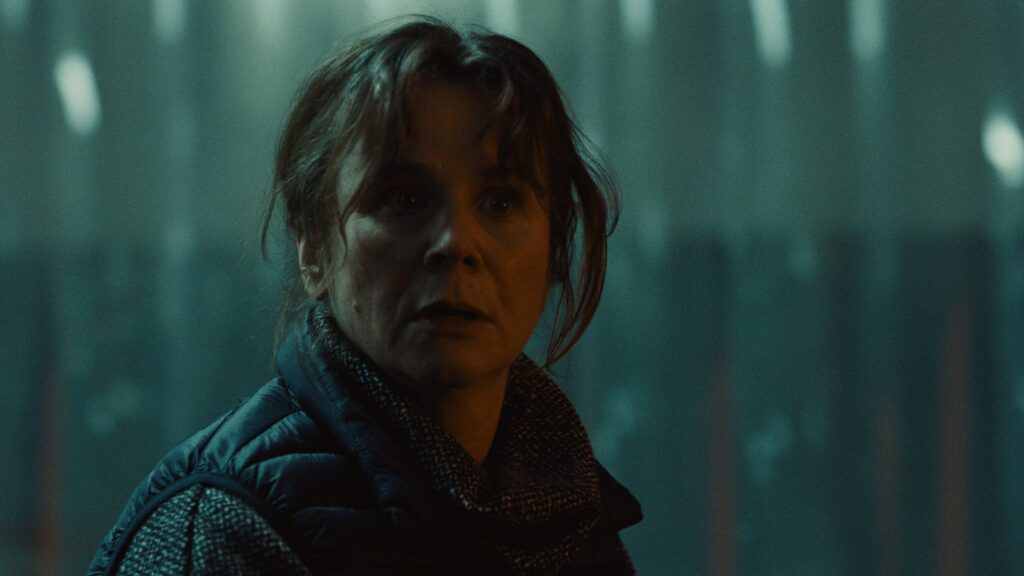Saela Davis and Anna Rose Holmer are filmmakers based in Brooklyn, New York. Over the past decade, they’ve collaborated on multiple short- and long-form fiction and nonfiction works. Each has assumed different craft roles — camerawoman, editor, writer, director, producer — specific to each project. Through these collaborations, their partnership has evolved and strengthened, leading them to join forces as directors. Their most notable collaboration is their critically acclaimed fiction feature film “The Fits,” which Davis edited and Holmer directed. The pair also wrote the script together. “The Fits” premiered at the 2015 Venice International Film Festival and screened at the 2016 Sundance Film Festival. It was nominated for Breakthrough Director at the 2016 Gotham Awards and Best First Feature at the 2017 Independent Spirit Awards, and won the Critics Award at the 2017 Deauville Film Festival. “God’s Creatures” marks their feature debut as a directing team.
“God’s Creatures” opens in theaters tomorrow, September 30.
W&H: Describe the film for us in your own words.
SD&ARH: In a windswept fishing village, a mother is torn between protecting her beloved son and her own sense of right and wrong.
W&H: What drew you to this story?
SD&ARH: It was a rare instance when what we were pondering as human beings was reflected back to us on the page of writer Shane Crowley and producer Fodhla Cronin O’Reilly’s profound and personal screenplay.
As filmmakers, we are fascinated by the echoes of trauma and how they reverberate through the minds and bodies of all those affected by violence. We are also compelled to tell stories about women negotiating their place in the world. Aileen’s narrative focuses on the fragility of forgiveness: what does it mean to carry the burden of another person’s crime? Is it possible to accept the darkest truths about those you love? How can you atone for the pain your actions inflict on another human?
W&H: What do you want people to think about after they watch the film?
SD&ARH: We hope that people leave the theaters thinking about Sarah and are able to find hope in her courage.
W&H: What was the biggest challenge in making the film?
SD&ARH: The emotional weight of the material and carrying it with us for the last few years. The family we created with our collaborators sustained us through our hardest days.
W&H: How did you get your film funded? Share some insights into how you got the film made.
SD&ARH: “God’s Creatures” is an independently financed film produced by Nine Daughters. A24 acquired worldwide rights and co-financed alongside equity financiers BBC Film, Screen Ireland, and WRAP (Ireland’s Western Region Audiovisual Producers Fund).
The production utilized the Section 481 tax credit in the Republic of Ireland as well as the post-production tax credit in the State of New York.
W&H: What inspired you to become a filmmaker?
SD: Since I could read, I’ve been obsessed with storytelling. For so long, I thought that I would become a novelist because I enjoyed writing stories. It wasn’t until I was a teenager that I fully understood the process of filmmaking and my passions shifted. I don’t think there was a single moment of inspiration, but I spent a lot of time watching films with my family and my love for the idea of filmmaking grew from that.
ARH: I wasn’t a film-obsessed kid, but I slowly began to realize that filmmaking was a conglomerate art form of all the things I loved: theater, photography, music, dance, writing. At 16, I saw an exhibit of Mary Ellen Mark’s photography alongside a screening of Martin Bell’s film “Streetwise” and the power of cinema was ignited within me.
W&H: What’s the best and worst advice you’ve received?
SD: The best advice I’ve received is from my Mom, who always says, “Do what makes you happy.” I try to forget anything that doesn’t add positive value or seem like productive thinking, so I can’t recall “worst advice.”
ARH: Best: Breathe in. Breathe out.
W&H: What advice do you have for other women directors?
SD&ARH: Beautiful things can stem from partnerships and collaborations. Whatever you aspire to do, don’t think that you must do them alone. Rely on your community. Ask for support when you need it.
W&H: Name your favorite woman-directed film and why.
SD: I have a rule to not have favorites, but some recent films that have moved me are Céline Sciamma’s “Portrait of a Lady on Fire” and Mati Diop’s “Atlantics” (“Atlantique”). I think they are so distinct and bold in their filmmaking choices. I rarely rewatch films, but I’ve revisited these two several times over the past couple of years.
ARH: Ditto re: favorites. I’m really looking forward to the release of a few woman-directed films this fall: “Aftersun,” directed by Charlotte Wells, “Nanny,” directed by Nikyatu Jusu, and “Riotsville, USA,” directed by Sierra Pettengill.
W&H: What, if any, responsibilities do you think storytellers have to confront the tumult in the world, from the pandemic to the loss of abortion rights and systemic violence?
SD&ARH: Art has many functions in a society. Sometimes it is necessary to provoke or agitate in response to the crises of your own time. Sometimes it is just as radical to offer and imagine worlds where life flourishes. Love. Hope. Joy. It is up to the artists to decide what their work can offer the here and now.
W&H: The film industry has a long history of underrepresenting people of color on-screen and behind the scenes and reinforcing — and creating — negative stereotypes. What actions do you think need to be taken to make it more inclusive?
SD&ARH: This is a conversation that must be had with those who hold financial and institutional power. We will keep making and continue to challenge the system whenever and however we can.







